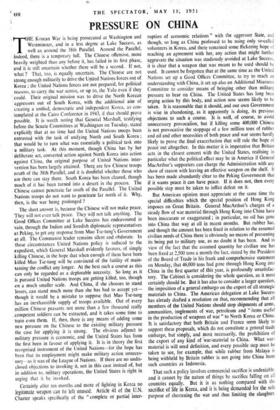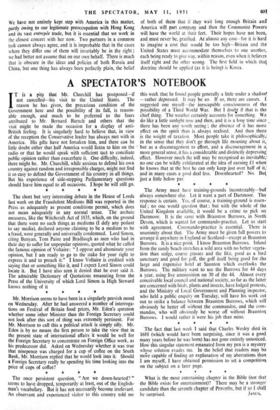PRESSURE ON CHINA
HE Korean War is being prosecuted at Washington and Westminster, and in a less degree at Lake Success, as well as around the 38th Parallel. Around the Parallel, Indeed, there is a temporary lull. The Chinese offensive, more heavily weighted than any before it, has failed in its first phase, and it is still uncertain whether there will be a second. If not. what ? That, too, is equally uncertain. The Chinese are not strong enough militarily to drive ,the United Nations forces out of Korea ; the United Nations forces are not prepared, for political reasons, to carry the war across, or up to, the Yalu even if they could. Their original mission was to drive the North Korean aggressors out of South Korea, with the additional aim of • creating a unified, democratic and independent Korea, as con- templated at the Cairo Conference in 1943, if that should prove possible. It is worth noting that General Marshall, testifying • before the Senate Committees at Washington on Tuesday, stated • explicitly that at no time had the United Nations troops been entrusted with the task of unifying North and South Korea ; that would be to turn what was essentially a political task into a military task. At this moment, though China has by her • deliberate act, converted action against North Korea into action against China, the original purpose of United Nations inter- ' vention has been largely attained. There are few Chinese troops south of the 38th Parallel, and it is doubtful whether those who are there can stay there. South Korea has been cleared, though much of it has been turned into a desert in the process. The Chinese cannot penetrate far south of the Parallel. The United Nations troops do not want to penetrate far north of it. Why, then, is the war being prolonged ?
• The short answer is, because the Chinese will not make peace. ' They will not even talk peace. They will not talk anything. The Good Offices Committee at Lake Success has endeavoured in vain, through the Indian and Swedish diplomatic representatives at Peking, to get any response from Mao Tse-tung's Government at all. The Communist leader remains silent and obdurate. In those circumstances United Nations policy is reduced to the expedient, which General Marshall evidently favours, of simply killing Chinese, in the hope that when enough of them have been killed Mao Tse-tung will be convinced of the futility of main- taining the conflict any longer. At the best such a course as this can only be regarded as a deplorable necessity. So long as it is pursued United Nations troops are getting killed, too, though on a much smaller scale. And China, if she chooses to stand losses, can stand much more than she has had to accept yet— though it would be a mistake to suppose that Mao Tse-tung has an inexhaustible supply of troops available. Out of every million Chinese peasants not more than a few thousand really competent soldiers can be extracted, and it takes some time to train even them. lf, then, there is any means of adding some new pressure on the Chinese to the existing military pressure the case for applying it is strong. The obvious adjunct to military pressure is economic, and the United States has from the first been in favour of applying it. It is in theory the first recognised instrument of the United Nations—for the hope has • been that its employment might make military action unneces- sary—as it was of the League of Nations. If there are no undis- closed objections to invoking it, not in this case instead of, but in addition to. military operations, the United States is right in urging that it be invoked.
Certainly after ten months and more of fighting in Korea no legitimate weapon can be left unused. Article 41 of the_U.N. Charter speaks specifically of the "complete or partial inter- ruption of economic relations" with the aggressor State, and though, so long as China professed to be using only so-called volunteers in Korea, and there remained some flickering hope of reaching an agreement with her, any action that might further aggravate the situation was studiously avoided at Lake Success, it is clear that a weapon that was meant to be used should be used. It cannot be forgotten that at the same time as the United Nations set up a Good Offices Committee, to try to reach an understanding with China, it set up also an Additional Measures Committee to consider means of bringing other than military pressure to bear on China. The United States has long been urging action by this body, and action now seems likely to be taken. It is reasonable that it should, and our own Government is wise in abandoning, as it apparently is doing, its previous objections to such a course. It is well, of course, to wioid unnecessary provocalion, but if killing some 400,000 Chinese is not provocative the stoppage of a few million tons of rubber and oil and other necessities of both peace and war seems hardly likely to prove the final exacerbation that will rule the hope of peace out altogether. In this matter it is imperative that Britain acts in the closest concert with the United States, realising in particular what the political effect may be in America if General MacArthur's supporters can charge the Administration with any show of reason with leaving an effective weapon on the shelf. It has been made abundantly clear to the Peking Government that if it wants peace it can have peace. If it does not, then every possible step must be taken to inflict defeat on it.
But American opinion must appreciate at the same time the special difficulties which the special position of Hong Kong imposes on Great Britain. General MacArthur's charges of a steady flow of war material through Hong Kong into China have been inaccurate or exaggerated ; in particular, no oil has gone into China that way at all in recent months. But rubber has, and though the amount has been fixed in relation to the assumed civilian needs of China there is obviously no means of preventing its being put to military use, as no doubt it has been. And in view of the fact that the assumed quantity for civilian use has been fixed at 2,500 tons a month the fact, stated by the President of the Board of Trade in his frank and comprehensive statement on Monday, that 46,000 tons had gone through Hong Kong into China in the first quarter of this year, is profoundly unsatisfac- tory. The Cabinet is considering the whole question, as it most certainly should be. But it has also to consider a larger question, the imposition of a general embargo on the export of all strategic materials to China. The American delegation at Lake Success has already drafted a resolution on that, recommending that all members of the United Nations should stop shipments of arms. ammunition, implements of war, petroleum and "items useful in the production of weapons of war" to North Korea or China. It is satisfactory that both Britain and France seem likely to support these proposals, which do not constitute a general trade embargo, but' simply, and most necessarily, the prohibition of the export of any kind of 'war-material to China. What war- material is will need definition, and every possible step must be taken to see, for example, that while rubber from Malaya is being withheld by Britain rubber is not going into China from such countries as Indonesia.
That such a policy involves commercial sacrifice is undeniable. and it cannot by the nature of things be sacrifice falling on all countries equally. But it is as nothing compared with the sacrifice of life in Korea, and it is being demanded for the sok purpose of shortening the war and thus limiting the slaughter. We have not entirely kept step with America in this matter. partly owing to our legitimate preoccupation with Hong Kong and its vast entrepoi trade, but it is essential that we work in the closest concert with her now. Two partners in a common task cannot always agree, and it is improbable that in the cases where they differ one of them will invariably be in the right ; we had better not assume that on our own behalf. There is much that is obscure in the ideas and policies of both Russia and China, but one thing has always been perfectly plain, the belief of both of them that if they wait long enough Britain and America will part company and then the Communist Powers will have the world at their feet. Their hopes have not been. and must never be, gratified. At almost any cost—for it is hard to imagine a cost that would be too high—Britain and the United States must accommodate themselves to one another, each being ready to give way, within reason, even when it believes itself right and the other wrong. The first field in which thai doctrine should be applied (as it is being) is Korea.



































 Previous page
Previous page